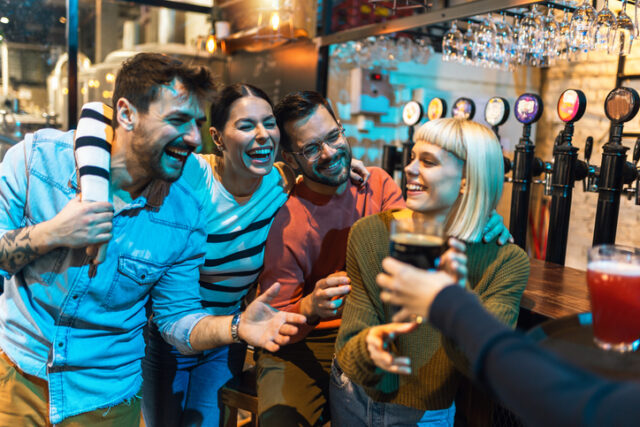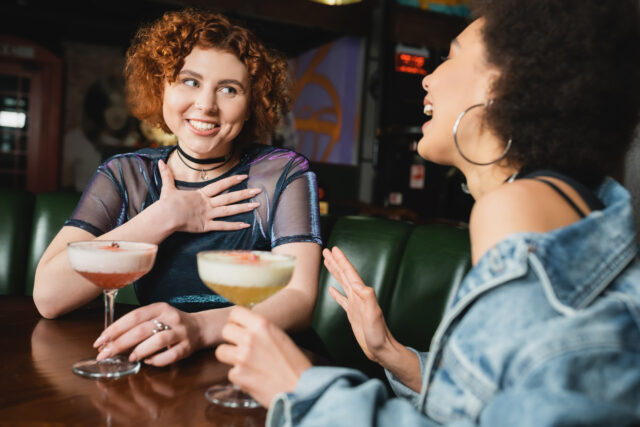There’s nothing wrong with enjoying a drink every now and then, but it’s always possible to have too much of a good thing.

Not everyone who drinks is a red flag, but when drinking starts to affect how they treat you, themselves, or the situation around them, it’s worth paying closer attention. If these things happen while you’re out with someone new, consider it a warning that their relationship with alcohol might not be a healthy one.
1. They always suggest meeting at a bar.

There’s nothing wrong with grabbing a drink on a first date, but if every suggestion they make revolves around alcohol, it could be a clue about where their comfort zone lies. When dinner turns into drinks, and drinks turn into more drinks, every single time, it starts to feel less like a casual vibe and more like a lifestyle.
It may suggest that they don’t know how to socialise or connect without it. If they never offer non-drinking date ideas or seem bored by anything that doesn’t involve alcohol, it’s worth asking why that’s the default.
2. They pressure you to drink more than you want to.

If you say you’re fine with one or choose not to drink at all, and they nudge you to “just have one more,” that’s not flirting—it’s a red flag. Respect around drinking is a basic boundary, and pushing past it can reveal a deeper disregard for yours.
It’s not about how much they drink; it’s about how they respond to your choice. If they treat your “no thanks” like a challenge or act offended by your limit, they’re showing you how they handle boundaries. And that matters.
3. They drink noticeably faster than you.

It might seem subtle, but if they’re speeding through drinks while you’re still halfway through yours, it could be a sign they’re used to chasing a buzz. It’s not always about quantity; it’s about the pace and purpose.
You’re not judging someone for relaxing, but it is about noticing patterns. Drinking quickly can be a way to numb, disconnect, or pre-game their own social anxiety. If that’s the vibe early on, it could grow into something harder to ignore later.
4. They act like a different person after a few drinks.

Watch for noticeable personality changes. If they go from sweet to snappy, flirty to aggressive, or confident to completely shut down, that shift isn’t just about the alcohol—it’s about how they handle themselves under the influence.
Drinking can amplify traits that are already there. If their drunk side is rude, reckless, or unpredictable, it’s more than just a “bad night”; it’s a preview of what might come up in future drama, stress, or emotional moments.
5. They get defensive when you ask how much they drink.

If the topic comes up, and they immediately shut down, joke it off, or get annoyed, it’s worth noticing. People who are self-aware and in control of their habits don’t usually need to dodge the question.
You’re not necessarily interrogating them, but it’d be nice to be able to have an honest conversation. If a simple “Do you drink often?” turns into a tense moment, they may be more uncomfortable with their own habits than they’re willing to admit.
6. They tell drinking stories that don’t sound fun, just chaotic.

Everyone’s got a funny night-out story, but if their “funny” stories always end in blackouts, lost phones, broken things, or drama, you might be hearing more about recklessness than humour. Some people mask messy habits as entertainment. If you find yourself listening and thinking, “That sounds kind of intense,” trust that feeling. There’s a difference between a wild night and a pattern of self-sabotage dressed up as a good time.
7. They treat drinking like a personality trait.
 Source: Pexels
Source: Pexels If they describe themselves as “the party one” or make constant jokes about being a heavy drinker, it might not be as casual as it sounds. When someone ties their identity to drinking, it often means it’s a bigger part of their life than they admit.
Pay attention to whether alcohol keeps coming up in unrelated conversations. If everything circles back to booze—weekends, holidays, stress relief, celebrations—it might be less about socialising and more about dependency wrapped in humour.
8. They get irritated when drinking isn’t an option.

If you suggest a dry activity like a morning hike or a coffee date, and they act disinterested or annoyed, it might reveal how closely they link fun with alcohol. It’s not a great sign if they can’t enjoy themselves without it.
Balance matters. If their idea of connection only exists where there’s a drink in hand, you’re likely seeing their limits. A healthy relationship includes a range of shared experiences—not just ones fuelled by drinks.
9. They don’t know when to stop.

If they keep drinking long after you’ve stopped, order another round without checking in, or start slurring while insisting they’re fine, that’s a sign (and not a good one). It shows a lack of awareness around limits, or an unwillingness to acknowledge them.
That doesn’t mean they’re automatically a problem drinker, but it does suggest their relationship with alcohol may be more important than they let on. If they regularly ignore cues to slow down, it’s something to keep in mind.
10. They brag about how much they can handle.

If they talk about how much they can drink like it’s a skill or badge of honour, take note. High tolerance isn’t impressive; it often means they’ve been drinking enough, long enough, to need more for the same effect. It’s not always obvious, but when someone is proud of being able to “outdrink everyone,” it’s worth asking why that matters so much to them. Sometimes, bragging masks a habit they’re not ready to confront.
11. They blame alcohol for bad behaviour.
 Source: Unsplash
Source: Unsplash If they brush off rude comments, emotional outbursts, or boundary-crossing by saying, “I was just drunk,” that’s a red flag. Alcohol might loosen inhibitions, but it doesn’t invent entirely new behaviours—it brings buried ones to the surface.
When someone regularly uses drinking as an excuse for how they treat you, it’s not a one-off—it’s a pattern. And blaming the booze is often a way of avoiding responsibility they don’t want to take.
12. You feel more anxious than relaxed around their drinking.
 Source: Unsplash
Source: Unsplash If their drinking makes you uneasy, even if you can’t put your finger on why, that feeling matters. You might find yourself watching how much they’ve had, predicting their mood, or trying to steer the night in a safer direction. When someone’s habits make you feel more on edge than at ease, it’s a sign that something’s off. You shouldn’t have to play babysitter or feel like you’re managing the vibe to avoid something spiralling.
13. They can’t seem to enjoy your company without it.

Maybe it starts off fun, but over time, you notice that they’re only affectionate, chatty, or confident when there’s alcohol involved. If their warmth or attention disappears without a drink in hand, that’s something to pay attention to.
Real connection doesn’t need a buzz to exist. If the chemistry only turns up when you’re drinking together, it might not be chemistry—it might just be the alcohol. And that’s not a stable foundation for anything long term.




